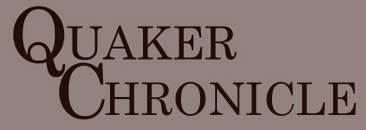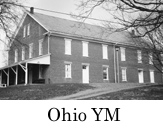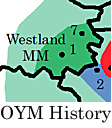Ohio General Meeting was the primary body of Primitive Friends in Ohio. It was comprised of 10 local meetings, which were organized into three MMs from 1865 to 1874. Ohio GM is sometimes called "Maulite" in honor of its prime sponsor, Joshua Maule of Concord.
Origins
Wilburite Friends had been the strongest in Ohio YM and Philadelphia YM since the early 1840s, where the intellectual movement that looked at early Friends was strong. At that time, Friends of the 17th century were called the "primitive Friends," and by the mid-1840s those Friends who sought guidance from them were coming to be called the Primitive Friends.
Following the divisions of 1854, Wilburite Friends failed to unite. Ohio and Philadelphia charted an independent course, not exchanging epistles with any other body. Ohio went so far as to ban the receiving or sending of certificates of membership with any body except for Philadelphia YM. The Primitive Friends sought a full circle of correspondence among Friends of like mind, such as New England, New York, and Baltimore YMs and Salem QM in Iowa. In the late 1850s, Wilburite bodies not recognized by Ohio entered into correspondence as the Primitive Friends. They suffered a Kingite-Otisite division in 1859-1862, creating a duplicate set of bodies.
Frustration with the policies of Philadelphia YM led to a general meeting of Primitive Friends, held at Fallsington, Pennsylvania, in 1860. Leading Primitive Friends attended and discussed their options. Those with Kingite tendencies, who favored recognition of Ohio and Philadelphia, withdrew, leaving those with Otis tendencies to continue the event. The Otisite Primitives formed Fallsington General Meeting and entered into correspondance with the other Primitive bodies.
The Division in Ohio 1862-1863
A local controversy in Ohio led to the Middleite-Primitive division. The issue was how to deal with Primitive Friends in Iowa, many of whom were related to Ohio Friends. Ohio Primitives, still in Ohio YM, sought recognition of Salem QM (Iowa). Ohio Middleites forced through a decision to ban the exchange of members with Iowa Primitives and then began to open new meetings that competed directly with those already established by Iowa Primitives.
The issue came to a head at Chesterfield in 1862. There, the women's MM Clerk, Belinda Hobson, was a Primitive. The women's meeting was majority Primitive, but the men's meeting was majority Middleite. Iowa Primitives had many relatives at Chesterfield. When Hobson refused to enter a minute from Pennsville QM into the minutes, Chesterfield reached a crisis. At that same time, a son of Joshua Maule who lived nearby was on his deathbed, so Joshua Maule was also in the area. Hobson withdrew from the meeting, taking the minute book with her. Chesterfield Primitives built a new meeting house across the street and started meeting separately in 11/1862.
Other Ohio divisions followed. The issue at Flushing and Concord, rather than the situation in Iowa, was the decision of Ohio YM in 1862 that allowed men to pay money not to serve in the Union Army as well as other war taxes. Maule and others refused to pay any war taxes and were not prosecuted. Most Friends who remained in Ohio YM agreed with Maule, but a minority of them left with him.
Ohio General Meeting
The first session of Ohio General Meeting was held at Chesterfield on 6/20/1863, thus helping complete the Primitive circle of correspondence. An epistle was received from New York YM (Otis), which was read. A committee was appointed to draft epistles to Fallsington GM and Baltimore YM (W). OGM approved a document for publication, with the title An Address to the Members of the Society of Friends in Ohio and Elsewhere. The body did not have unity to reply to New York YM (Otis), as some Friends wanted to correspond with New York YM (Kingite). The King-Otis problem also applied to Iowa, and as late as 1865 OGM was still unable to agree to have fellowship with either group of Iowa Primitives (even though at that time only one family was left in the Iowa Kingite group and two in the Iowa Otisite group).
In the succeeding meetings, OGM decided to hold its sessions three times a year. A membership recorder was appointed, and it was found that there were about 160 members of OGM. In 1865, OGM agreed to establish monthly meetings as follows:
– Chesterfield MM: MWs at Chesterfield, Plymouth, and Hopewell
– Harrisville MM: MWs at Flushing, Concord, Plainfield, Harrisville (later joined by a meeting in Scipio NY)
– Salem MM: MWs at Salem, New Garden
A division in OGM took place in 1867. Fallsington GM sent an epistle to OGM, in which it expressed concern for its role in a disagreement in New York relating to Thomas Lamborn. Joshua Maule argued that OGM should not read the epistle, and OGM agreed. This decision effectively took OGM out of the Primitive circle of correspondence. This action bothered those who saw OGM as undermining the Primitive circle of correspondence. Daniel Koll, a minister at Salem, became the leader of those who sought to maintain these ties. Salem Meeting agreed with him, withdrew from OGM, and joined Fallsington GM in 1867. At this time, Koll's followers came to be called the "Kollites." They were soon joined by the Plymouth Primitive Meeting as well as a faction from Chesterfield.
A second division took place in 1869. At this time, a group of Friends called the Remnants emerged. This group maintained that Friends should drop all business meetings, since they did not lead to unity among the members. Joshua Maule was a leader of the Remnants in Ohio. Other Remnant groups separated from Fallsington GM.
After the Remnants left, OGM changed its pattern of meeting three times a year. It instead decided to meet twice a year, rotating among Chesterfield, Concord, and New Garden.
In early 1872, Harrisville MM accepted a small worship group into membership. This worship group was located in Poplar Ridge NY, and included in its membership was Thomas Lamborn. The OGM association with Thomas Lamborn is the reason Primitive Friends historian William Hodgson classified OGM as a "Lamborn" meeting.
Interest in OGM declined fairly rapidly in the mid-1870s. In 1874, OGM discontinued its MMs. Many members were being drawn back to Ohio YM, which was making headway in working with incipient Conservative meetings in the midwest. At OGM on 5/19/1877 at Chesterfield, the group decided to disband. Thomas Lamborn took the OGM minute book to Poplar Ridge, where it remained into the late 20th century. The book is now stored at Swarthmore College.
In 1881, Ohio YM minister Elwood Dean expressed an interest in purchasing the Chesterfield Primitive Meeting House to convert it into a residence. Joshua Maule worked with him to find the remaining 43 members of OGM and get them to sign over their interest to the building. It was torn down in the 1930s. |






